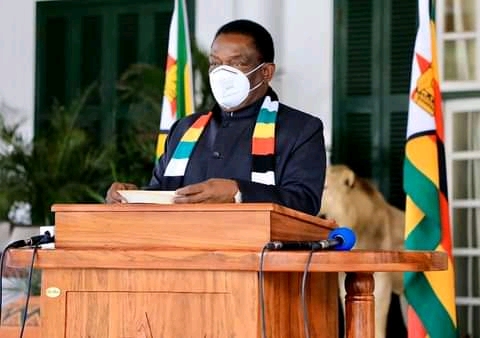By: Ollus Ndomu
The Zimbabwean government has advanced plans aimed to make Covid-19 vaccination compulsory in a nation almost losing the fight against the pandemic. Speaking last Saturday during the graduation ceremony of 1 200 prison officers in Bulawayo, the country’s President Emmerson Mnangagwa said no Zimbabwean had the right to say no to the jab.
“I urge all officers, graduates to take the injection. No-one can refuse,” Mnangagwa said.
Through a Covid-19 vaccination program which rolled out early February this year, 747 330 people have taken their first jab out of which, 502 178 are receiving the second dose. With an alarming spike in daily infections driven by the Indian and South African variants, Zimbabwe is facing an acute shortage of vaccines; a situation which poses a question as to how the president’s highly emphasized forced vaccination will be implemented.
Health authorities disclosed last week that the country is yet to receive 2.5 million vaccines from China after which the government will roll-out compulsory vaccination.
“The government will continue to ensure the availability of vaccines. So no one will escape being injected,” Mnangagwa added.
Contrary to the government’s approach to fighting the virus, Itai Rusike, Executive Director for Community Working Group on Health urged authorities to respect human rights adding that forced vaccination would create resistance.
Rusike further called on the government to increase vaccine literacy and awareness while insisting that taking that taking the jab should be a voluntary decision.
“What is important is for government to scale up information dissemination and convince the general public to appreciate why they need to be vaccinated because taking up vaccines should be done willingly by people with COVID-19 vaccine literacy,” Rusike said.
“Force-marching people to take vaccines will not result in high uptake, but in resistance and by imposing vaccines, the country may lose its vaccination programme gains where it is considered highly by other countries in the region.
“Threatening people by saying it will be compulsory will infringe on their human rights and it does not make sense to do so when the country does not have adequate vaccines in Bulawayo and Harare at the moment and there are several people who got their first jab, but are failing to get the second dose.”
President for Medical and Dental Private Practitioners Association of Zimbabwe, Johannes Marisa said while Mnangagwa’s plans could be well-meaning, forced vaccination would infringe on human rights.
“Mnangagwa was just trying to relay the message that it is important for everyone to get vaccinated. It is unfortunate but people cannot be forced to take vaccines as everyone has their own rights. If really government compels people to get vaccinated, then I foresee heaps of litigation papers in a short time,” Marisa said.
If government goes ahead to implement its forced Covid-19 vaccination plan, Zimbabweans who have not been vaccinated would be denied access to some public services in future, critics say.


